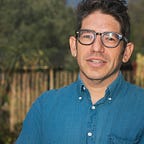How Collective Consciousness Can Help Us Right Now
In networks we trust
When I was 10 years old, growing up on a farm in rural Appalachia, I went for a walk with a group of friends.
As we walked up the overgrown driveway and by the crumbling barn behind my house, I heard a strange sound coming from the grass next to us.
I distinctly remember thinking two things at that moment: 1) that I’d never heard a sound like it before; and 2) I still somehow knew it was a rattlesnake.
I turned toward the sound and saw a coiled-up rattlesnake hissing and shaking its tail, just as I feared. We scampered away and called for our parents.
Hearing the sound and then turning to see the rattlesnake is one of those childhood memories that’s stayed with me. I can easily replay it in my mind and often do.
To this day I find myself wondering: How did I recognize that sound? What knowledge bank was I drawing from?
Collective consciousness
Many of our preconceptions come from something called collective consciousness. In the late 19th and early 20th centuries, some important writers like Sigmund Freud, Carl Jung, and Émile Durkheim were among the first to explore this domain.
The great development…
